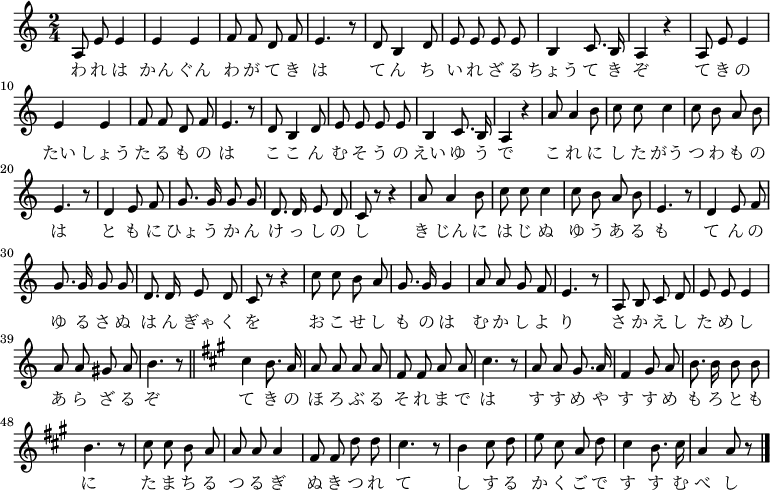Battotai (marcha militar)
| «Battotai» | ||
|---|---|---|
| Publicación | 1885 | |
| Género | gunka | |
| Compositor | Charles Leroux, 1885-86 | |
| Letrista | Masakazu Toyama | |
| Idioma original | Japonés clásico | |
| País de origen |
| |
Battotai, también conocida como la Marcha de la Rama del Ejército Japonés (抜刀隊, Battō-tai o 陸軍分列行進曲 Rikugun bunretsu kōshinkyoku), es una marcha japonesa compuesta por Charles Leroux en 1912 y utilizada por el Ejército Imperial Japonés y las fuerzas de autodefensa de Japón.[1]
Trasfondo[editar]
La canción hace referencia a las tropas que usaban Espada (o Battotai) tropas que lucharon en la Batalla de Tabaruzaka durante la Rebelión de Satsuma de 1877. Debido a los problemas de suministro y las fuertes lluvias, los rebeldes de Satsuma se vieron obligados a enfrentarse al Ejército Imperial Japonés en un combate cuerpo a cuerpo. Infligieron grandes bajas contra las fuerzas imperiales, que en su mayoría eran reclutas sin experiencia en el manejo de espadas. El teniente general Yamagata Aritomo seleccionó y desplegó hombres del área circundante que eran expertos con espadas. Llamó a esta unidad Battōtai o «regimiento de espada desenvainada».[2]
Letra[editar]
| Japonés (Kana & Kanji)[3] | Japonés (Rōmaji) | Traducción inglesa[4] | Traducción española | |
|---|---|---|---|---|
我は官軍我敵は |
Ware wa kangun waga teki wa |
We are the Imperial Force and whoever disobeys us |
Somos la Fuerza Imperial y quien nos desobedece
¿Son los enemigos abandonados por el Cielo y la Tierra? La cabeza del enemigo, un héroe legendario Comparado con ninguno a lo largo de la historia
¿Están los intrépidos guerreros preparados para morir? Aunque su coraje rivaliza con el dios más feroz. Quienquiera que se rebele contra el Imperial
Ninguno de ellos ha prosperado a través de todas las épocas Hasta que nuestros enemigos caigan Salgan, salgan, todos juntos
Salgan, resueltos a morir
De la Tierra Imperial y los cuerpos de los samuráis Después de la Restauración, todos ellos permanecen abolidos Pero todavía somos capaces de blandir nuestras Katanas japonesas
Todos nuestros amigos y enemigos Deben caer debajo de nuestras cuchillas Para quien tenga los espíritus Yamato
No te avergüences con la demora Hasta que nuestros enemigos caigan Salgan, salgan, todos juntos
Salgan, resueltos a morir. |
Partitura[editar]

Referencias[editar]
- ↑ «陸上自衛隊:サウンド». 陸上自衛隊 公式Webサイト (en japonés). Consultado el 13 de julio de 2021.
- ↑ Kotō, Masayoshi (1987). 西南戦争警視隊戦記 (en japonés). 産経新聞データシステム. pp. 221-222.
- ↑ «新体詩抄. 初編 - 国立国会図書館デジタルコレクション».
- ↑ «Japanese Imperial Army Choir – Battotai lyrics + English translation (Version #2)». lyricstranslate.com (en inglés). Consultado el 11 de febrero de 2021.
